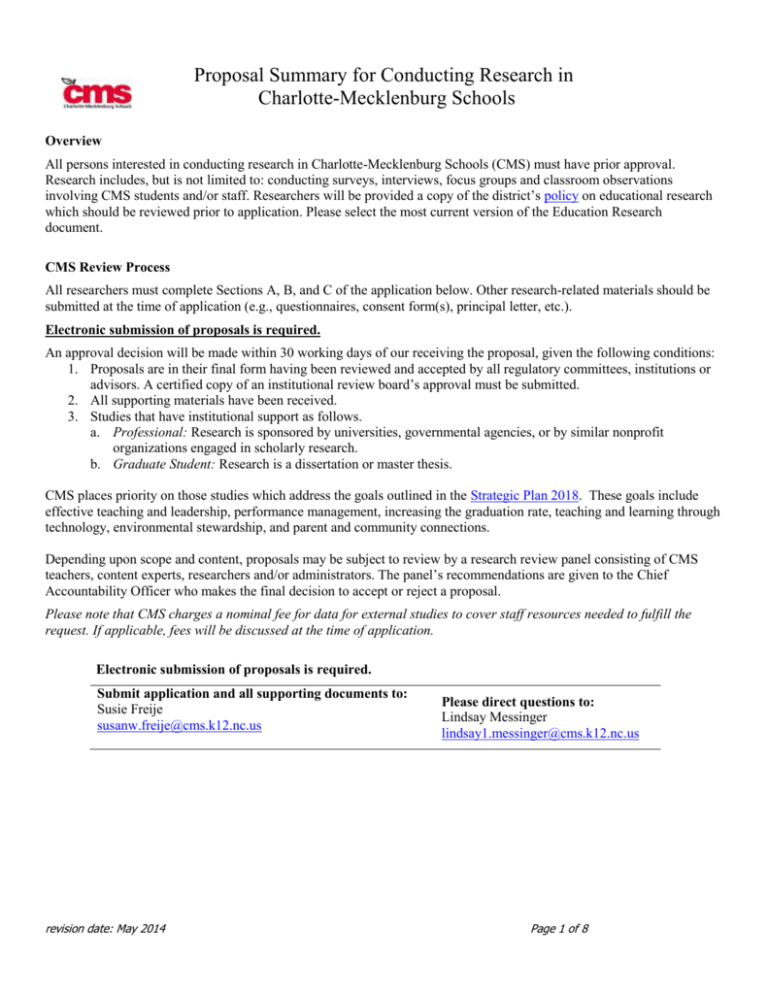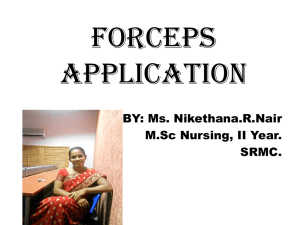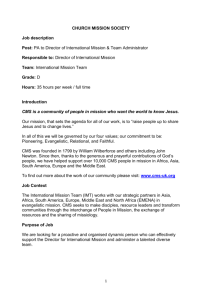CMS Proposal Application - Charlotte
advertisement

Proposal Summary for Conducting Research in Charlotte-Mecklenburg Schools Overview All persons interested in conducting research in Charlotte-Mecklenburg Schools (CMS) must have prior approval. Research includes, but is not limited to: conducting surveys, interviews, focus groups and classroom observations involving CMS students and/or staff. Researchers will be provided a copy of the district’s policy on educational research which should be reviewed prior to application. Please select the most current version of the Education Research document. CMS Review Process All researchers must complete Sections A, B, and C of the application below. Other research-related materials should be submitted at the time of application (e.g., questionnaires, consent form(s), principal letter, etc.). Electronic submission of proposals is required. An approval decision will be made within 30 working days of our receiving the proposal, given the following conditions: 1. Proposals are in their final form having been reviewed and accepted by all regulatory committees, institutions or advisors. A certified copy of an institutional review board’s approval must be submitted. 2. All supporting materials have been received. 3. Studies that have institutional support as follows. a. Professional: Research is sponsored by universities, governmental agencies, or by similar nonprofit organizations engaged in scholarly research. b. Graduate Student: Research is a dissertation or master thesis. CMS places priority on those studies which address the goals outlined in the Strategic Plan 2018. These goals include effective teaching and leadership, performance management, increasing the graduation rate, teaching and learning through technology, environmental stewardship, and parent and community connections. Depending upon scope and content, proposals may be subject to review by a research review panel consisting of CMS teachers, content experts, researchers and/or administrators. The panel’s recommendations are given to the Chief Accountability Officer who makes the final decision to accept or reject a proposal. Please note that CMS charges a nominal fee for data for external studies to cover staff resources needed to fulfill the request. If applicable, fees will be discussed at the time of application. Electronic submission of proposals is required. Submit application and all supporting documents to: Susie Freije susanw.freije@cms.k12.nc.us revision date: May 2014 Please direct questions to: Lindsay Messinger lindsay1.messinger@cms.k12.nc.us Page 1 of 8 Proposal Summary for Conducting Research in Charlotte-Mecklenburg Schools SECTION A: APPLICATION INFORMATION Project Title: Researcher’s Full Name(s): Title/Position: University/Institution/Organization: Mailing Address Email Address*: Daytime Phone: Date Submitted†: Is this the final version of the proposal? Yes No I have reviewed and understand the CMS policy on educational research. Yes No Projected Start Date: Projected Completion Date: The research is related to a: Professional Project Doctoral Study Masters Study Have you included a copy of your Institutional Review Board (IRB) approval form with your application? Yes No ALL applicants MUST provide documentation from their institution’s review board for the protection of human subjects before CMS will consider approval. Graduate Students Only: Please fill out the information below Charlotte-Mecklenburg Schools reserves the right to contact university faculty associated with a proposed research project. Advisor contact information is required for graduate student projects. Advisor’s Name: Title/Position: Email Address: Daytime Phone: Mailing Address: Have all advisory/regulatory committee members formally approved this research? Yes SECTION B: STUDY SPECIFICATIONS * † We will send your response to this address. Please note that you will receive correspondence no later than 30 business days from the date of submission. revision date: May 2014 Page 2 of 8 No Proposal Summary for Conducting Research in Charlotte-Mecklenburg Schools Study supports the following CMS Strategic Plan Goal(s) Check all that apply Goal 1 Maximize academic achievement in a personalized 21st century learning environment for every child to graduate career and college ready. Goal 2 Recruit, develop and retain a premier workforce. Goal 3 Cultivate partnerships with families, businesses, faith-based groups and community organizations to provide a sustainable system of support and care for each child. Goal 4 Promote a system-wide culture of safety, high engagement, cultural competency and customer service. Goal 5 Optimize district performance and accountability by strengthening data use, processes and systems. Goal 6 Inspire and nurture learning, creativity, innovation and entrepreneurship through the expansion of strategic school design Study includes participants at a: Check all that apply. Pre-K School Elementary School Middle School High School Alternative School Administrative Office Language Arts Mathematics Science Social Studies Art Physical Education Other (please explain) Area(s) of study: Check all that apply. Foreign Language Technology Poverty Type of study: revision date: May 2014 Quantitative Career/Vocational Education Talented & Gifted Exceptional Children Disabilities Qualitative After-School ELL/ESL/LEP Study Abroad with Mixed-Methods Page 3 of 8 Proposal Summary for Conducting Research in Charlotte-Mecklenburg Schools Are you a CMS employee?‡ Yes No Has any CMS staff member already agreed to support you r research upon approval of this study? Yes No If yes, please list name, title or position and office of CMS staff member who has agreed to support this study Name Title/Position Office If yes, please provide documentation of the CMS staff member agreement of support Please note: Researchers who are CMS employees may not conduct qualitative or mixed methods research where the researcher is employed. This guideline is supported by IRB guidelines that protect participants from being coerced: “Likewise, teachers or supervisors who conduct research could (wittingly or unwittingly) coerce student- or employeesubjects into participating. Thus any potential conflicts of interest must be identified and resolved before IRB approval is granted.” Does study employ: Check all that apply. Non-school personnel surveys Yes No School administrator surveys Yes No Teacher surveys Yes No Student surveys Yes No Parent surveys Yes No Non-school personnel interviews Yes No School administrator interviews Yes No Teacher interviews Yes No Student interviews Yes No Parent interviews Yes No Teacher assessment Yes No Student assessment Yes No Classroom observations Yes No Videotaping or audio recording of CMS staff Yes No Videotaping or audio recording of CMS students Yes No revision date: May 2014 Page 4 of 8 Proposal Summary for Conducting Research in Charlotte-Mecklenburg Schools Does study access, require, and/or record: Identifiable student-level information * Check all that apply. Yes No Yes No Identifiable staff-level information Yes No De-identified staff-level information Yes No Aggregated student-level information Yes No Aggregated staff-level information Yes No School-level information Yes No De-identified student-level information ** Other (please explain) *Identifiable student-level information includes student name, address, birth date, grades, test scores, and IEP information, EC or LEP status. Please refer to CMS Educational Research Policy for more information. **Information that has been de-identified by CMS Accountability personnel. Study locations -- Please list all proposed study locations: Please describe your site selection criteria: Note for large populations: Researchers whose study design includes reaching out to large samples of research participants, defined here as: 10+ schools 15+ school administrators 50+ teachers will need to submit an official letter of support from the Executive Director of the relevant department. If your study involves human subjects please complete the following; if not, please skip to Section C. revision date: May 2014 Page 5 of 8 Proposal Summary for Conducting Research in Charlotte-Mecklenburg Schools Participant Information Number of student participants Number of teacher participants Number of school administrator participants Number of other participants (please specify) Please describe the subject selection criteria: Describe how subjects will be recruited. Please include information on who will recruit, and the method and location of recruitment. Please include a copy of the recruitment materials (e.g. flyer, letter, etc) being used. What is the expected time commitment for each type participant (e.g. principals, parents, teachers, students)? Will monetary remuneration or other incentive be offered in exchange for participation in the research? In all research situations involving students, you must obtain legally effective informed consent (including parental permission and assent from minors, when applicable.) There are required elements of informed consent that must be included in the informed consent process and documents. The required and optional elements can be found in the federal regulations at http://www.hhs.gov/ohrp/humansubjects/guidance/45cfr46.htm#46.116. Parent/guardian consent forms should be written in language appropriate to the person granting consent. Similarly, student assent forms should be written using developmentally-appropriate language. If applicable, please attach a principal letter (a letter that would be sent to the principal of any potential participating schools) to describe the study. The purpose of the principal letter is to provide detailed information about the research design/methodology, recruitment processes, participant burden, confidentiality/anonymity, risks/benefits and uses of the data. The principal letter is not a consent form. If data will be collected from principals, a separate consent form must be provided for that purpose. Researchers may contact principals prior to approval only to ascertain their interest in having their school participate in the research study but they may not request principals’ formal consent until they have approval from the CMS Office of Accountability. If the study is approved, the Office of Accountability will provide researchers with a Letter of Approval to Conduct Research. Only then can principal consent be sought. revision date: May 2014 Page 6 of 8 Proposal Summary for Conducting Research in Charlotte-Mecklenburg Schools SECTION C: PROPOSAL SUMMARY Instructions: Please answer each question below WITHIN THIS DOCUMENT. Relevant documents (e.g., consent forms, questionnaires, IRB approvals, etc.) should be sent electronically with this application. 1. Provide a brief (1,200 words maximum, 10 pt. font) literature review that summarizes the background and rationale for your study. This review should include appropriate peer-reviewed sources (attach separately). Please define acronyms or language specific to your field of study. 2. Briefly state the overall purpose of the study. 3. What are the specific research questions and hypotheses for the study? (Bullet form please) 4. Provide a Methods section. This must include: Procedures: Please describe what will be done, how, and by whom, in appropriate detail for a reviewer to understand. Proposed Analyses: Please include your data analysis plan Include copies of all surveys and/or instruments that you plan to use in your study. 5. What is your timeline for collecting data? 6. Describe the materials, resources, information or other needs from the school system (such as demographic information, test scores, proficiency rates, etc.) All CMS quantitative data that are not available publically must be requested through the Office of Accountability; data cannot be provided by school employees. Please note that there may be a fee for data requests. 7. Identify any ethical issues you feel may be of concern to CMS or participants, and explain how you have addressed them. 8. What is your plan to share and disseminate results (i.e. state with whom and how you will share your results)? 9. Proposal Summary Suggestion: Write in a language that can be understood by those not in your field. Also, the reader needs to understand the what, why, and how of your study in one brief paragraph. revision date: May 2014 Page 7 of 8 Proposal Summary for Conducting Research in Charlotte-Mecklenburg Schools 10. Data/Record Storage and Security Data/record security is critical. You should ensure that all hard copy and electronic data are securely stored to prevent unauthorized access, disclosure, or loss. Hard copy records should be stored in a manner that limits access to only authorized individuals. For example, filing cabinets should be locked and placed in secured/locked rooms. Electronic data should be saved on a device that has the appropriate security safeguards such as unique identification of authorized users, password protection, encryption, automated operating system patch (bug fix) management, anti-virus controls, firewall configuration, and scheduled and automatic backups to protect against data loss or theft. Researchers possess a strong sense of ownership for their data and consequently often manage their own computers. Laptops, Personal Digital Assistants, removable hard drives, “jump” or “thumb” drives, CDs, DVDs and other portable devices and removable media are very convenient to ensure your data are always at your fingertips. External hard drives are a cost-effective and convenient way to back up your data. However, all of these devices require encryption solutions if used to store Restricted or Sensitive data (i.e., identifiable information). 10a. Describe data storage plans: 10b. What will you do with the data once the study has been completed? 10c. Describe the method of destruction. Please note any use for any purpose not described here will require an additional research application and review. 10d. Will the data being stored in electronic format be encrypted? 10e. If data will not be encrypted, please explain the rationale and the proposed method of data security. 11. Confidentiality 11a. Will you maintain the participants’’ contact information after the data have been collected? If yes, specify the purpose(s) for this. 11b. Will you share individual-level data with other researchers or practitioners beyond the designated key research personnel? If yes, please note, researchers are only permitted to share individual-level data that has been de-identified with the ability to re-identify with written permission from CMS. 11c. Who will have access to the shared data? 11d. For what purposes will research data be shared? revision date: May 2014 Page 8 of 8



